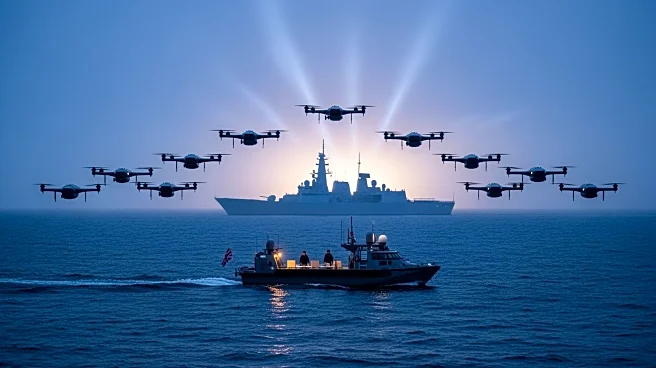What's Happening?
The Royal Navy has successfully conducted a trial involving a flotilla of uncrewed 'wolf pack' drone boats to escort warships. This exercise took place off the coast of Scotland, where five autonomous Rattler boats were remotely piloted by personnel stationed
500 miles away at the Portsmouth naval base. The trial, described as a 'milestone' by the Navy, demonstrated the potential of these drone boats in real-life scenarios. The Rattler boats, each operated by a two-person team, were equipped with cameras and sensors to provide data feedback to the control team. This exercise is part of the Navy's ongoing efforts to integrate autonomous systems into its operations, marking a significant step towards a hybrid fleet of crewed and uncrewed platforms.
Why It's Important?
The successful trial of the 'wolf pack' drone boats represents a significant advancement in naval technology, potentially transforming maritime operations. The integration of autonomous systems could enhance the Navy's operational capabilities, allowing for more flexible and efficient mission execution. This development is particularly relevant in the context of modern warfare, where the use of unmanned systems is becoming increasingly prevalent. The ability to operate these vessels without direct human control could reduce risks to personnel and increase the Navy's strategic options. This trial also underscores the importance of technological innovation in maintaining military readiness and superiority.
What's Next?
Following this successful trial, the Royal Navy is likely to continue developing and refining its autonomous systems. Future exercises may focus on expanding the capabilities of these drone boats, including their ability to operate independently and in coordination with other naval assets. The Navy's Disruptive Capabilities and Technology Office, along with the Fleet Experimentation Squadron, will likely play key roles in these developments. As the technology matures, it could lead to broader adoption across other branches of the military, potentially influencing global naval strategies.
Beyond the Headlines
The use of autonomous systems in military operations raises important ethical and legal questions. As these technologies become more advanced, there will be a need to address issues related to accountability, decision-making, and the potential for unintended consequences. Additionally, the deployment of such systems could influence international norms and regulations regarding the use of unmanned vehicles in conflict zones. The Royal Navy's advancements may prompt other nations to accelerate their own development of similar technologies, potentially leading to a new era of naval competition.
















